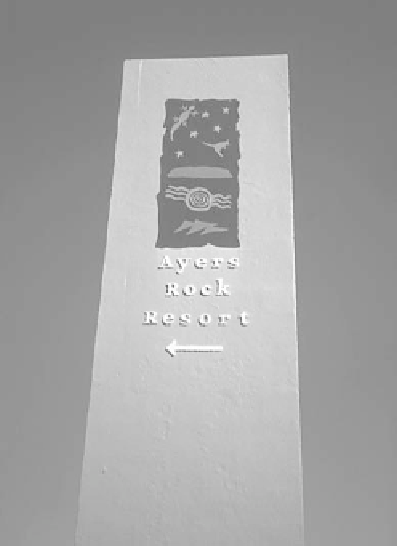Travel Reference
In-Depth Information
Using an Advertising Agency
Although promotion managers must know the
fundamentals of marketing, advertising, personal
selling, and public relations, the specialized skill
and experience of an
advertising agency
can
greatly increase business—and can do it pro
t-
ably. An advertising agency will do the following:
&
Work with ideas in copy and layout. Copy is
the term used to describe written messages;
layout refers to the arrangement of copy, art,
and pictures.
Advise on the choice of media to convey
advertising messages, devising an organized
and carefully worked-out plan using online,
newspapers, magazines, radio, TV, guidebooks,
posters, direct mail, postcards, folders, or other
advertising media.
&
This outdoor sign at Ayers
Rock Resort in Australia
features the resort's logo,
reinforcing a branded
image in the consumer's
mind.
Photocourtesy
oftheauthor.
Conduct market analysis and research so that
advertising efforts can be directed to the best
prospects.
&
Assist in planning and carrying out a public relations program. The advertising program must be
planned objectively by setting forth speci
c, achievable goals. The advertising agency can help to
establish such goals. When seeking the services of an advertising agency, look at the agency's
experience in promoting tourism, and check its past advertising campaigns and clients to
determine the campaign
&
'
s effectiveness.
The Advertising Budget
No magic formula exists for setting the advertising budget. How much to spend is always a perplexing
question. Commonly used methods include a percentage of last year
s sales, a percentage of potential
sales, or the industry percentage. These methods are all
flawed because advertising should create sales
and cause things to happen, not react to what has happened in the past or in other companies.
Consequently, the best method of setting advertising budgets is to determine the objectives to be
performed and allocate the proper amount to reach these objectives.
Promoting a new tourist destination area will require more money than will promoting one with an
established clientele. The speci
c amount to budget for advertising and promotion will depend on
each situation. However, as a general rule, most resorts spend about 3 percent of sales on media
advertising and about 3 percent on other promotion activities.
No matter what expenditures are, efforts should be made to coordinate the promotion program so
it is consistent with the product offered and consumer expectations will be met. Word of mouth is the
least expensive, most convincing form of personal advertising. A friendly and capable host encourages
this type of communication. Visitors who are treated as very important persons will not only come
back, they will recommend the area to their friends. All facilities, services, hospitality, and pricing
policies must be directed to this one goal
'
—
a happy, satis
ed visitor.
Personal Selling
Personal selling
is the oldest method of creating demand. Because it is adaptable to the prospect, it is
the most compelling and effective type of selling. In contrast to advertising, which is the impersonal
component in the promotional mix, personal selling consists of individual, personal communication.
Personal selling is so widely used because it offers maximum
flexibility. Sales representatives tailor
their presentation to each individual customer. They can tell which approaches are working and which









Search WWH ::

Custom Search